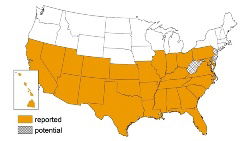
Washington D.C. — A disease has spread to areas it normally hasn’t been, the American Heart Association is warning.
The disease, mostly found in Central and South America, has become more common worldwide, American Heart Association officials said. Health officials have noted for years that it affects an estimated 300,000 U.S. residents or more.
Chagas disease, a cause of heart failure, stroke and sudden death, results from a parasite transmitted by “kissing bugs,” a committee stated in a medical journal Aug. 20.
“Kissing bugs” get their nickname because they like to bite people on their faces.
Doctors say the next time you’re out in a wooded area or on the patio, you should be on alert.
But it isn’t the bite itself you should be concerned about, according to Dr. Robert Springer.
“So while they’re biting you, ‘kissing’ you in the middle of the night, they also happen to be defecating there,” Springer said. “You wake up the next morning, you’re wiping the sleep out of your eye and you’ve just moved infected excrement into your eye and into your mouth mucous membrane. Then you become infected.”
The excrement contains the parasite that causes the virus. The symptoms include swelling of the eye or area where the parasite entered the body. It can also be associated with fever and headaches, but in extreme cases, Chagas disease can be deadly.
The disease can also be passed through contaminated food or drink, from pregnant mothers to their babies and through blood transfusions and organ transplants, the American Heart Association notes.
The above map shows where “kissing bugs” have been reported across the U.S., according to the Centers for Disease Control and Prevention.
“Worst-case scenario is a chronic infection that can involve the heart,” Springer said. “It can involve the intestines and especially in the heart. It can cause large enlargement of the heart and heart failure and other heart troubles, including rhythm disturbances.”
“Kissing bugs” infest adobe houses in Central and Southern America, according to the American Heart Association. They are found across much of the U.S., but most indoor structures, built with plastered walls and sealed entryways, prevent insect invasion, and “kissing bugs” rarely infest indoor areas of houses.
Not all “kissing bugs” are infected with the parasite that causes Chagas disease.
The Centers for Disease Control and Prevention says the majority of the current cases are travel-related, meaning the person got the illness while traveling out of the country.
Medications can cure infections caught early, the American Heart Association also notes.
(Associated Press)



